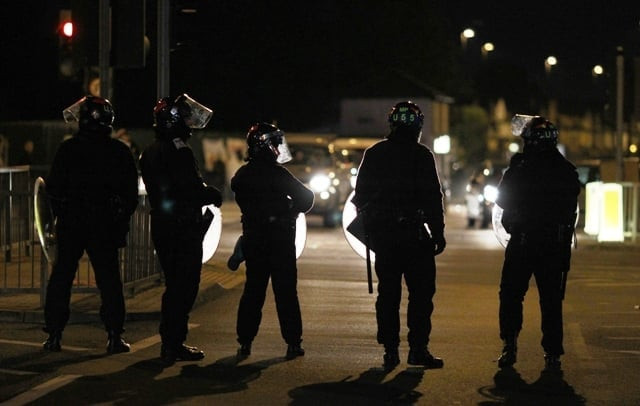London police seek new chief after nightmare summer
The new chief will arrive at one of the toughest times in the force's 180-year history.

A month after Metropolitan Police commissioner Paul Stephenson and one of his deputies resigned in 24 hours, the deadline closed Wednesday for applications to become Britain's top police officer leading the country's biggest force.
Stephenson's resignation from the Met, as the force is known, came just weeks before Britain's worst riots for decades erupted, meaning his deputy was left in charge as gangs went on the rampage for several nights in the capital.
Four candidates are vying to become the third London police chief in as many years, a job which will require both a hardened crime fighter and a skilled political operator to raise the morale of the scandal-tainted force.
With less than a year to go before Britain's biggest peacetime policing operation at the London Olympics, the new chief will arrive at one of the toughest times in the force's 180-year history.
"At any time the role of police commissioner for Scotland Yard is the most prestigious and challenging police role in the world," Blair Gibbs, head of the crime and justice unit at rightwing think tank Policy Exchange, told AFP.
"On top of that, we have the once in a generation challenge of the Olympics and the unprecedented level of international media scrutiny and justified concerns about the conduct and integrity of the senior leadership."
The four candidates are believed to be Hugh Orde, a former Northern Ireland police chief; the Met's acting commissioner Tim Godwin; head of Glasgow-based Strathclyde Police Stephen House; and Bernard Hogan-Howe, the Met's acting deputy commissioner.
There was speculation former New York police supremo Bill Bratton, brought in to advise the government after the riots, could be a candidate but Home Secretary Theresa May insisted Tuesday that the commissioner must be British.
Whoever gets the £260,000-a-year ($430,000, 300,000 euro) job, which includes national responsibility for counter-terrorism as well as protecting some 7.2 million Londoners, the top priority will be to prevent a repeat of the unrest.
The first riot erupted on August 6 in Tottenham, north London, when a peaceful protest over the fatal shooting by police of a man in the deprived neighbourhood was hijacked by youths who torched and looted buildings.
Police initially appeared reluctant to tackle the rioters, and their approach was partly blamed for encouraging copycat unrest to erupt in the capital and then spread to other English cities during four nights of violence.
The Met chief will have to balance developing a tough response to unrest with the need to make savings, police are making large cuts as part of austerity measures and the London force is likely to lose some of its 32,500 officers.
High on the agenda for the new chief will also be fixing the Met's tarnished reputation in the wake of the phone-hacking scandal, which forced the resignation last month of Stephenson and assistant commissioner John Yates.
The hacking controversy kicked off the Met's awful summer, as a long-simmering scandal over alleged phone hacking at the News of the World (NotW) spiralled into a crisis which prompted the closure of the Rupert Murdoch-owned paper on July 7.
The force had long faced accusations that an initial 2006 investigation into hacking was inadequate amid suspicions that some of its officers were too close to executives at Murdoch's News International, which published the NotW.
But the arrest of Neil Wallis on suspicion of phone hacking presented strong new evidence of a cosy relationship when it emerged the former NotW deputy editor was hired to work as a consultant for the Met shortly after leaving the paper.
Several days after the revelation, Stephenson stepped down on July 17, saying that the controversy could distract the force ahead of the Olympics.
He denied any wrongdoing and was cleared Wednesday by the police watchdog of misconduct over the phone-hacking probe.
Yates, who took the decision in 2009 not to reopen the hacking inquiry and also allegedly helped Wallis' daughter get a job with the Met, announced his resignation a day after Stephenson.
For the new chief, putting distance between the Met and the hacking scandal will be crucial, commentators say.
"It's not just about standing up to gangs," said crime researcher Nick Cowen from think tank Civitas, which studies civil society.
"It's also about an ability to stand up to the other gangs of people like the papers who are perfectly happy to distort the criminal justice system when it suits them."



















COMMENTS
Comments are moderated and generally will be posted if they are on-topic and not abusive.
For more information, please see our Comments FAQ